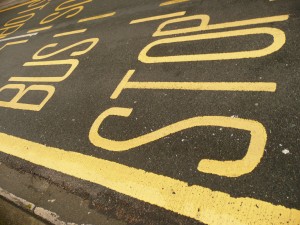 Mass transit is an efficient way to get around. There are huge economic savings in reducing our use of personal automobiles. These are savings that can be experienced directly by Winnipeggers.
Mass transit is an efficient way to get around. There are huge economic savings in reducing our use of personal automobiles. These are savings that can be experienced directly by Winnipeggers.
Money spent on fuel and vehicles is money that can’t be spent on other things. By creating alternative mass transit options, more money remains in the pockets of consumers and that money could be used in other ways to build a stronger economy in Manitoba.
Spending on fuel is literally burning money. Every dollar not spent on fuel is a dollar that can be spent on something else. If a bus is providing transportation services that approximate services offered by a car (see here and here), then it can lead to huge savings. According to the Province of Manitoba, one busload of passengers takes 40 cars off the road and saves 70,000 litres of fuel. This is fuel that we either didn’t need to import or could have exported.
Vehicles themselves are extremely expensive. Since we don’t produce any here, it is again money that is leaving Manitoba’s economy. In 2012, Manitoba’s top imported commodity was personal vehicles. We paid $630 million for all those vehicles. Reducing the total vehicles imported by even a small amount could mean huge savings in Manitoba’s economy. And it doesn’t mean that those who personally enjoy owning and caring for their car can’t, it just means that those who don’t like owning cars don’t have to.
Vehicle damage and personal injury caused by traffic accidents is another major cost to our economy. While fuel and the vehicle itself actually provide a transportation service for your money (however inefficiently), accidents provide no service, they are just a cost to individuals and to Manitoba’s economy. From an economic standpoint, accidents and injuries do redistribute money to mechanics and doctors, but they represent an absolute destruction of physical and human capital. In 2013, MPI paid out an average of $2.6 million per workday in claims to Manitobans. That makes for a total payout of $676 million last year for vehicle damage and injury. Although a monetary figure doesn’t capture the real emotional hardship that vehicle accidents cause to Manitobans every year, it does give us a measurable price of accidents and it is quite high.
Money not spent on cars and fuel is money that can be used in other ways in Manitoba’s economy. Personal vehicle imports and car accidents alone represent over a billion dollars in inefficiency “costs” to Manitoba’s economy. If we can meet our transportation needs in Winnipeg more effectively, Winnipeg’s share of this money could be used in alternative ways to spur other parts of our economy.
Whether Winnipegger’s choose to use this extra money on consumption or savings, it will have positive spin-offs. Extra dollars spent on goods and services produced in Manitoba have what is called the mulitiplier effect in our economy –Every dollar spent in Manitoba creates more than one dollar more economic activity. When Manitobans save money, whether they invest in Manitoba or elsewhere, their returns on investments will also boost our economy if investors spend them here.
Making public transit work in Winnipeg is incredibly important. Money spent on personal vehicles in Manitoba represent real costs to our economy. If we can find ways to get around more efficiently we can actually see significant savings and have a real impact on Winnipeggers’ personal budgets. Even better, these savings make Winnipeg a more affordable place to live and boost other parts of our economy.
We need a transit plan that works in Winnipeg and we need it sooner rather than later.
